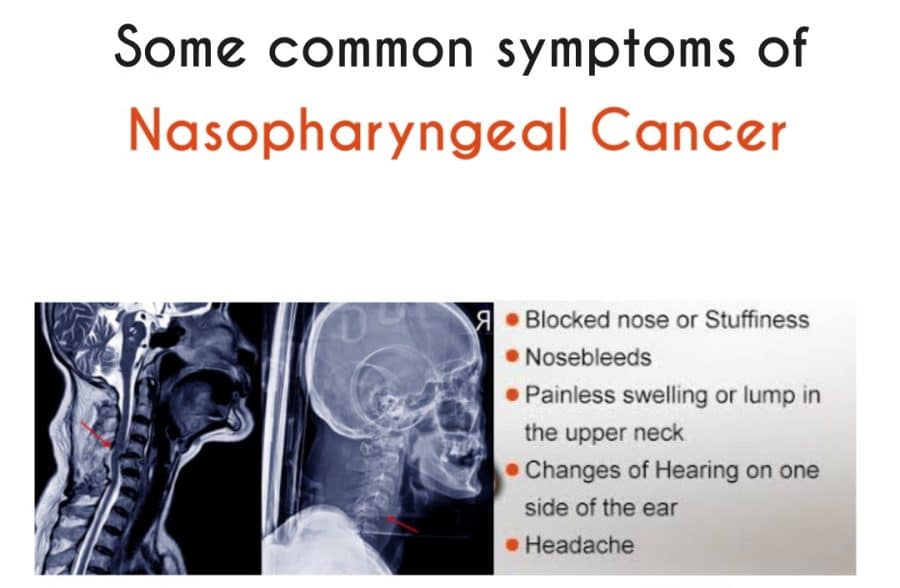The rare type of headache and neck cancer is nasopharyngeal carcinoma. It begins behind the nose in the top of your neck. This region is known as the larynx.
The larynx is put on the bottom of your head over the back of the mouth in perilous condition. The larynx opens up your nasals. Air rushes into your neck and nasopharynx via your Nasal passages and finally into your respiratory system when you are breathing.
The nasopharynx is the area on the back of the throat well above vocal folds (mouth roof). It brings your nose to the rear of your mouth and lets you inhale in the nose.
Nasopharyngeal carcinoma signs
The fact that the indications are identical from the other, less severe illnesses is often harder to identify.
In addition, many persons with nasopharyngeal cancer have no indications till the illness is severe.
Nasopharyngeal carcinoma signs may be as follows:
- Neck swellings.
- Hearing impairment.
- tinnitus.
- A stuffy nose or clogged.
- nose bleedings.
Check your GP if any alarming symptoms arise, especially then after a few weeks they do not really heal. It is highly improbable that nasopharyngeal cancer will develop in them, but it's important to get them evaluated thoroughly.
Take2 Health can help you go through the non-invasive screening process for the diagnosing process.
Causes of Nasopharyngeal Carcinoma
Scientists do not understand what causes NPC. The malignancy is highly associated with the Epstein-Barr viral infection, nevertheless.
Even if EBV infection is frequent, nasopharyngeal cancer is not typical in everyone with EBV. In the United States, most people with an EBV infection never experience long-term issues. Scientists continue to study how EBV results in nasopharyngeal cancer, but it can be linked to the nasopharynx cells with the genetics of the virus influencing DNA. The alteration in DNA leads to aberrant cell growth and breakdown, creating cancer.
If you eat foods heavy in salty fish and meat, the risk of cancer will increase. The hazard may also raise for cigarettes and alcohol, however its connection with the carcinoma is unclear. Some experts think that chemicals harm cells progressively.
How to Diagnosis Nasopharyngeal Carcinoma
One’s medical professional will interview them and conduct a physical examination of their ailments, health history and personal background. This involves looking at your ears, and nasal passage in depth. You can be directed to a specialist, termed an otolaryngologist, who specializes in these fields.
Your neck might also be felt by the medical practitioner. Usually, nasopharyngeal cancer sufferers have swelling in their necks. The cancer spreads to the lymph glands, which is an indication.
A bendable and illuminated tube can be put in the nostrils to let the physician observe the nasopharynx effectively. This is referred to as a nasopharyngoscopy. It assists the doctor in checking the zone for unusual rate of growth, clotting, and perhaps other conditions.
Your physician might prescribe a biopsy if the evaluation is unusual. An excisional biopsy is a procedure that involves the removal of a small piece of tissue under a microscope. Following nasopharyngoscopy, a sampling may be performed. The biopsy can be done with a very narrow, sterile needle inserted in the bump if there is indeed a mass in your throat. Screening scans can discover or establish whether nasopharyngeal cancer is spreading.
Difficulties
Difficulties of nasopharyngeal cancer may be:
Cancer grows to infiltrate neighboring components. Progressive carcinoma can cause issues by growing as big as possible to infect adjacent structures, including the throat, bones, and brain.
Cancer spreads to different parts of the body. Nasopharyngeal cancer often extends far beyond nasopharynx (metastasis). Most patients experience regional metastasis with nasopharyngeal carcinoma. This signifies that cancerous cells from the primary tumor, such as lymphatic nodes, have spread to surrounding locations.
What causes nasopharyngeal carcinoma?
It is not known what the actual causation of the nasopharyngeal cancer is, however, certain variables may enhance your susceptibility.
These comprise:
- Eating salt-healed beef and fish is quite significant.
- The primary virus that is causing glandular fever is the Epstein-Barr exposure.
- Working a job where you have been confronted with hardwood dust on a daily basis.
- Having a first-degree family , such as a father, who had the illness.
The likelihood of contracting some kinds of nasopharyngeal cancer could enhance your getting subjected to HPV.
How to fight cancer of the nasopharyngeal
A team of several professionals that work collaboratively, termed a multidisciplinary team, will look after you if you really are afflicted with nasopharyngeal cancer. Your medical expert participants will examine what they consider to be the best way for you to tackle.
Radiotherapy
One of the most prevalent treatments for nasopharyngeal cancer is radiation therapy.
It could be used alone for treating cancer in the earliest stages or for severe malignancies in combination with other treatments such as chemotherapy. External radiation therapy is usually employed. It comprises a device that focuses on the area that needs processing through high-energy radiation particles.
A sophisticated form of indirect radiotherapy known as intensity-module therapy which is utilized for nasopharyngeal cancer. It consists of targeting beams of radiation with varied intensities from various angles in a cancer.
Chemotherapy.
Drugs for killing cancer cells are used for chemotherapy. Treatment of nasopharyngeal carcinoma is usually not beneficial on its own. However, along with radiotherapy or biologic medications, it may help you to live longer.
Surgery.
Tumor removal surgery is not typically done due to the position of the tumor close to nerves and blood arteries. The eye and other surrounding structures may suffer lasting harm. Not every person can have surgery for nasopharyngeal cancer. While addressing your healthcare decisions, your doctor will determine the place and degree of your tumor.
Outlook
The prospects for nasopharyngeal cancer rely on your age, wellness, and progression of your diagnosis.
Radiotherapy can typically cure nasopharyngeal carcinoma relatively early in the day; however, the problem is occasionally discovered later because no apparent symptoms are always present until later.
Severe malignancies are managed with a chemical and radiation therapy combination. They often become treatable if the cancer is not spreading further than the location of the head and neck.



